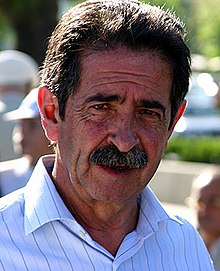President of Cantabria
| President of Cantabria | |
|---|---|

Coat of arms of Cantabria
|
|
| Seat | Santander, Cantabria, Spain |
| Appointer | The King of Spain Following a voting by a majority of the Parliament of Cantabria and with the countersignature of the President of the Parliament of Cantabria |
| Term length | 4 years. No term limits are imposed on the office. |
| Constituting instrument | Constitution of 1978 |
| Inaugural holder | José Antonio Rodríguez Martínez |
| Formation | 1982 |
| Website | cantabria.es |
The President of Cantabria, according to the Autonomy Statute of Cantabria, presides over the Government of Cantabria, directing its activities, coordinating the Administration of the autonomous community, designating and separating the councillors, and holds supreme representation of the autonomous community and ordinary representation of the State in Cantabria. He or she is elected by the Parliament of Cantabria among its members, and is appointed by the King of Spain.
The Parliament elects him or her by absolute majority in first session or by simple majority in subsequent. Between each session at least forty eight hours have to pass. If two months after the constitution of the Parliament there hasn't been elected a candidate, it is dissolved and there is another call for elections.
The President of Cantabria is chosen by the Parliament of Cantabria after the autonomic elections of Cantabria, in which ones, people votes for the political parties that will form the Parliament.
According with the established in the third point of the article 17 of the Organic Law 8/1981, of December 30, of the Statute of Autonomy of Cantabria:
3. The President of the Autonomous Community shall be elected by Parliament from among its members and appointed by the King. To this end, the President of Parliament, after consultation with the political forces represented therein and after hearing the Table of the Parliament, shall propose a candidate or candidate for President of the Autonomous Community. The candidate or candidate will present his program to the House Plenum and, in order to be elected, must obtain an absolute majority in the first voting; If this qualified majority is not obtained, a new voting shall be held after forty-eight hours and shall be elected if it obtains a simple majority. If no such majority is obtained in this second voting, successive proposals will be processed in the form previously foreseen.(...)
...
Wikipedia

